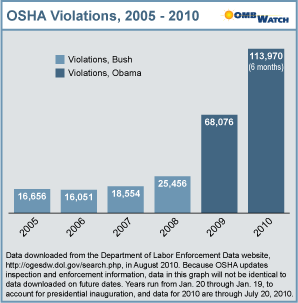
In its first two years, the Obama administration stepped up the enforcement of rules meant to protect the environment, workers, and consumers, according to a new OMB Watch report. This activity is a welcome development after years of regulatory negligence that likely played a part in the worst environmental disaster in U.S. history and the most fatal coal mine disaster in 40 years.
According to the report, "The Obama Approach to Public Protection: Enforcement," the administration has backed away from the limited-government philosophy that has characterized views on regulation for several decades dating back to when President Ronald Reagan declared that government was a problem, not a solution. Instead, President Obama and administration officials have decided that government can serve the public best by taking proactive strides in the regulatory arena.
Take, for example, the Occupational Safety and Health Administration (OSHA), perhaps the most successful enforcement story thus far in the Obama administration. OSHA is sending more inspectors to the country's most dangerous workplaces and citing employers for safety and health violations with greater frequency.
Critics will look at this news as evidence of error or overreach by the Obama administration. After all, regulation has become a dirty word among Big Business lobbyists, like those from the U.S. Chamber of Commerce, and their allies in Congress. They tell us that regulation hurts small businesses and makes hiring more difficult.
But it's not the butcher, the baker, or the candlestick maker that government is after - it's the chronic scofflaws that put the public at great risk. As the OMB Watch report discusses, Department of Labor officials said this year that they recognize most businesses are law-abiding but the ones who aren't need to be held accountable.
That recognition is translating into policy. In April, OSHA (part of the Department of Labor) launched its Severe Violator Enforcement Program targeted at repeat and egregious violators of workplace safety and health standards.

OSHA's focus on high-risk workplaces means that the number of workplace violations is on the rise according to data compiled by OMB Watch (see graph), but it also means that workers are safer. Unlike the Bush administration, which emphasized voluntary compliance and often turned a blind eye to dangerous conditions, the Obama administration has put employers on notice: break the law by jeopardizing your employees and face the consequences.
As the OMB Watch report shows, other agencies are charting a similar course. The Food and Drug Administration is increasing its use of warning letters with the goal of, among other things, preventing companies from making false or misleading claims about their products. The U.S. Environmental Protection Agency is looking for new and creative ways to prevent farm runoff and other pollution from contaminating drinking water.
Americans should view increased enforcement as a good thing. The foot soldiers of the federal government are on the front lines, attempting to prevent the next regulatory crisis.
Many inside and outside of the administration have become acutely aware in 2010 of the need for effective enforcement. In April, Massey Energy's Upper Big Branch mine in West Virginia exploded, killing 29 miners. Just weeks later, BP's Deepwater Horizon killed 11 men on board and spilled at least 185 million gallons of oil into the Gulf of Mexico. Runaway Toyotas, contaminated eggs, and faulty drywall made headlines, too.
Everyone benefits when regulations work properly. Consumers, workers, and the environment are protected from risks from which they cannot protect themselves, and, as the OMB Watch report says, those on the receiving end of regulation can benefit too: "Even application of regulation through enforcement ensures a level playing field for law-abiding citizens, organizations, and businesses."
It's sometimes difficult or impossible to see the impact of successful enforcement. The crisis averted doesn't make headlines; the success in protecting the public from eating tainted food, for example, goes unnoticed. But such examples indicate that enforcement is working and underscore why some regulations need to be made stronger.
Unfortunately, the attacks from powerful special interests will continue no matter what, and they have the money to make government regulation sound evil. Ultimately, some corporations simply want to roll back regulation and enforcement in order to protect their profits, not the public interest.
The Obama administration must soldier on. The president and his staff need to weather the criticism from the Chamber and others, establish new rules to address ignored hazards, and maintain an on-the-ground presence that places the public's interest first. The alternative is much worse: the next tragedy that could have been prevented.
The OMB Watch report is the second in a three-part series. The first report, covering agency rulemaking, was profiled in The Huffington Post in October. The final report, delving more deeply into the regulatory process, will be published in the coming weeks.